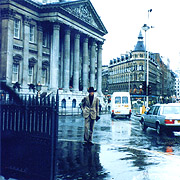- When I Took That Train
Infobox Album |
Name = When I Took That Train
Type =Album
Artist =Jandek

Released = 2005
Recorded = Unknown
Length = 43:32
Label =Corwood Industries
Producer =Jandek
*
Last album = "A Kingdom He Likes "
(2004)
This album = "When I Took That Train"
(2005)
Next album = "Glasgow Sunday "
(2005)"When I Took That Train" is the 40th release by avant-folk/blues
singer/songwriter Jandek , and the first of four released in 2005 by his ownCorwood Industries label, as #0778.Overview
This album continues a narrative thread begun on "
The End of It All ". On that album, the relationship gets off to a happy start, but this leads to what may be a psychotic episode and a subsequent breakup (see "The Door Behind " and "A Kingdom He Likes "). Here the relationship is once again "on", as the artist decides to try to make things work. "I talked to you today/it was so nice/you laughed, sounded happy, in a surprised way", he says on the opening track, before the two set out terms: "I gotta see if you can accept my requirements/I gotta see if I can adjust myself to meet your requirements/ but I would like to try, definitely." Whatever might have happened, the two have a definite physical agenda. Reflecting on how good the "first time" was, the narrator says, "I guarantee, I’ll match that first time...next time...not too long from now." Musically, the vocals are mostly moaned over a somewhat-meandering, bluesy acoustic guitar - which rarely changes what it is playing from song to song - the album can seem more like a "diary" or a series of letters with minimalist musical accompaniment.Perhaps more than anything, this album proves that Jandek isn't making albums for anybody's genre. Musically, vocally, and lyrically the album is removed from the majority of his catalog, and it consistently defied categorization by the few critics who tried to review it. Each fairly short song stays within strict parameters, though close listening reveals numerous changes in vocal stylings from spoken to moaned to some outright wailing. The guitar is mostly strummed, and dissonantly tuned. Lyrically the album goes from one point to the next, as the artist talks about his excitement of seeing his love again, followed by a readdress of his infatuation with her ("Close to You"), which leads to the two meeting again and him being "knocked out, knocked down -dead" at her beauty. He mentions that she can always "look for the exit door" and that he understands; he's been around. This leads to a good time had by all, as he lets her know what she means to him and becomes more than a little excited about seeing her again. Overall, the storyline seems to be headed in a "happily ever after" direction, until the album takes a strange move toward the end: "I've been here/six million years, he says in "Thing Called Me," where he tells the universe to "stay back." Then the "spiders" from "
The Door Behind " return and the album ends on the long strange trip of "My Escape," in which the singer considers going to Seattle, or Pensacola, Florida. Afraid of commitment? Afraid of himself? It's never made clear, but the album, unsettlingly, ends with the line, "I'll/take (your heart) out for food/Eat my heart out/take the rest of me inside of you." And this seems to be the end of this narrative, as the next album released ("Glasgow Sunday ") covered Jandek's first live show.Track listing
#I Talked To You Today – 4:07
#When I See You Again – 2:52
#The Image Of You – 3:27
#Close To You – 3:22
#You Took Me For A Ride – 4:13
#What Else Is There – 2:16
#Wouldn't You Agree – 3:22
#You Made Me Know It – 2:45
#Angel Moves – 3:43
#Thing Called Me – 5:43
#My Escape – 6:50
Wikimedia Foundation. 2010.
